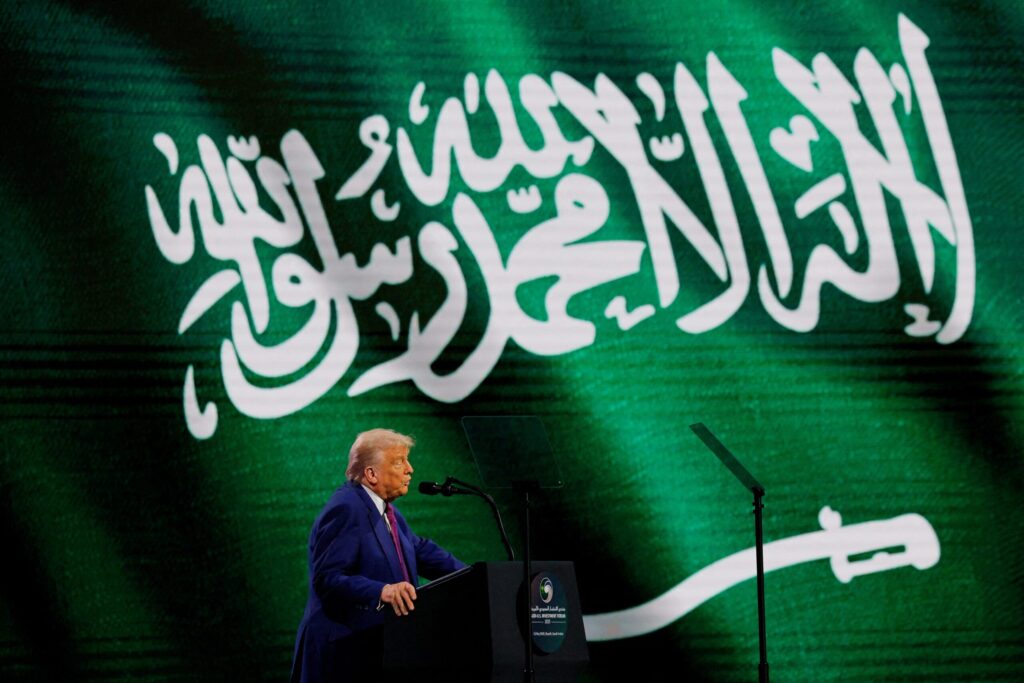Having failed to make the cut for accreditation to the Saudi-US Investment Forum in Riyadh (tut tut to the kingdom’s media authorities), I was glued all Tuesday to the live feed from the Saudi capital.
Even via the small screen in my home office, the enthusiasm for US President Donald Trump from the crowd in the Ritz Carlton hotel was genuine, palpable – and infectious.
I found myself spontaneously jumping up with a clenched fist in the air shouting “fight, fight” and leaping around making strange arm shapes to the YMCA theme tune.
Well, not really. I just made up that last bit for a cheap laugh.
But it really was a joyous welcome for the 47th president. If you can imagine a Make America Great Again rally during his victorious campaign trail last year in a Midwest football stadium, add gilded chandeliers the size of alien spaceships and dress the crowd in gold-lined bishts (a traditional cloak worn by men, often associated with formal occasions) and abayas (an outer garment worn by women), you have some idea.
Despite the cheesy showbiz razzamatazz, most commentators agreed afterwards that there was some real substance to the president’s long address.
Quite apart from all the multi-billion dollar deals he announced and the lifting of Syrian sanctions, there was the confirmation that the US under Trump was abandoning the old neoconservative approach to the Middle East and leaving the Arab future to “the people of the region, not the nation-builders”.
This was music to the ears of the Saudi leaders and their citizens and got loud applause. One old hand in the hall likened it to President Obama’s “new beginning” speech in Cairo in 2009. But let’s hope Trump’s address has a more lasting effect than that.
As ever with Trump, there was the usual casual relationship with statistics. There was “no inflation” in the US, border crossings were down “99.999 percent”, and $10 trillion dollars on foreign investment had flowed into America over the past two months.
I doubt the Saudi constituency was even aware of the debatable nature of these figures – and if they were, they would have been about as interested in them as they were in his ramblings about the electoral college vote.
It’s often hard to tell when the teleprompter ends and Trump begins, but there were several occasions when he clearly spoke off the cuff, and these were the most illuminating.
The benefit of watching via livestream instead of being in the hall was that you could clearly see the reaction of other leaders as the president spoke, rather than a silhouette of their heads from way back in row Z, and it was here that the most bizarre moments arose.
“Tim Cook isn’t here,” he shouted, surveying the ranks of American technocrats in the first few rows of the crowd. The Apple CEO may have had a perfectly good reason for not being in the hall, but he will no doubt face the music from the president for his non-attendance at some stage back stateside.
“I like you too much,” Trump said to Saudi Arabia’s Crown Prince Mohammed bin Salman, who placed a hand on his heart in reciprocation but who looked genuinely puzzled at the endearment. What does it even mean to like somebody “too much”? Surely “love” is the next logical step?
The other surreal moment was when Trump shouted, “Mohammed, you sleep at night?” to the crown prince and then left a short pause as though he was expecting a real response from his royal host. MBS again smiled a baffled grin but decided not respond with details of his sleep regime.
On the face of it, Trump’s question was a tribute to the tireless, round-the-clock effort the crown prince is putting into the momentous task of implementing the Vision 2030 transformation.
But rewatching it later, I thought there was a moment when their eyes met in mutual recognition and empathy.
The crown prince is a famously late-night person, arranging meetings into the early hours and apparently surviving on very few hours of sleep.
Trump too is notorious for his inconsistent sleeping patterns, often filing messages on X and Truth Social when the rest of the White House is safely tucked up.
The relationship between powerful people and short sleeping hours is a well established one. I think what we were seeing on stage at the King Abdulaziz International Conference Centre was the camaraderie of omnipotent insomniacs: sleep is for losers.
I myself dozed off that night humming the opening lines of YMCA: “Young man, there’s no need to feel down…”
Frank Kane is Editor-at-Large of AGBI and an award-winning business journalist. He acts as a consultant to the Ministry of Energy of Saudi Arabia



